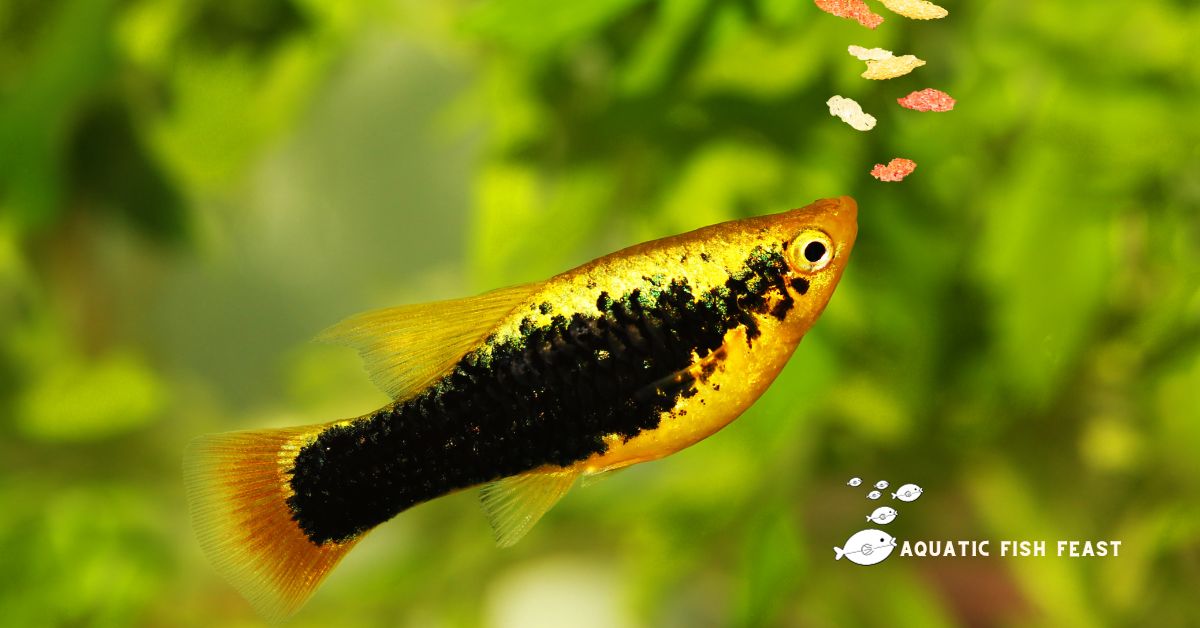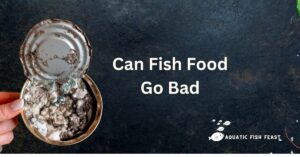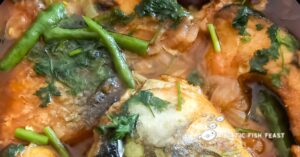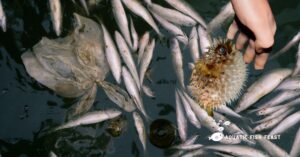Facts have shown what fish can eat besides fish food for proper growth and good health. Fish have diverse dietary requirements based on their species.
Commercial fish foods are formulated to meet the nutritional needs of many aquarium fish.
I will show you in this article a variety of other foods to keep your fish healthy and satisfied.
You may be looking for alternative food for your food, so sit back and come along with me as I take you through answering the questions: what can fish eat besides fish food?
Let’s do it now.
Read also: What clownfish like to eat.
Table of Contents
What Can Fishes Eat Besides Fish Food
Feeding your fish is one aspect you must pay attention to. It may surprise you that starvation does not necessarily kill a fish, but the food kills them.
So, you must pay attention to what you give them, especially when you are looking for alternative food when you don’t have their food.
Before we dive to know what to feed your fish when you don’t have their food, you should ensure you feed them two or three times a day in small portions; that is what they can eat at a time.
Also, remember something fundamental: each fish is different, so what they eat may differ when you want alternative food.
Here are some foods you can give them when you don’t have their food.
You can feed your fish with natural fresh foods like vegetables, fresh meat, such as mollusk meat, protein-rich worms, and raw meat.
But be careful not to allow them to eat much fat and blood.
Again, here is some fresh food you can give:
- Spinach
- Cucumbers
- Carrots
- Peas
- Pumpkins
- Bloodworms
- Mosquitoes, and
- Larvae.
What Do Goldfish Eat Besides Fish Food?
In the absence of goldfish primary food, various unique foods can be adapted occasionally to your goldfish to supplement its basic diet.
However, with these foods, you must feed them in little amounts at a time, giving them only what the fish can consume in one to two minutes and no more, and let the feeding be at least every other day.
Here are some of the alternative foods you can feed your goldfish with:
- Peeled peas
- Watermelon slices
- Bloodworms
- Ghost shrimp
- Daphnia
- Orange slices
- Mossworms
- Crickets
- Marine shrimp
- Leafy greens
- Cooked rice
- Grapes
- Cucumber slices
- Fish algae flakes
Goldfish need the correct feeding process, and you may affect them all together when not given the right food.
Remember that Goldfish are opportunistic feeders, so they will continue to eat as long as food is available, and when they are not controlled, it can hurt them.
What Do Cold Water Fish Consume?
Cold water fish are incredibly simple to care for and keep. Each species has several meals tailored to its nutritional requirements and digestive system. Floating sticks, grains, and flakes are the most prevalent.
Complete recipes eliminate the need for supplements and eliminate the need for you to worry about anything. Cold water fish like flakes and flakes because they float in the water longer and are easier for the animal to reach.
However, because the pellets that fish consume are heavier and fall faster to the bottom of the tank, certain less experienced fish will not benefit from it.
While scale debris may readily pollute the water and must be cleaned regularly to avoid this, the granules leave minimal residue and preserve the aquarium’s balance.
Goldfish, bubble eyes, betta splendens, telescope fish, comet fish, Chinese neon, and Koi carp are good candidates for cold water fish food.
What Do Tropical Fish Consume?
Tropical fish may consume both live and dry food, the former consisting of mosquito larvae, shrimp, and tiny worms, and the latter of flakes, granules, or tablets. You give a balanced supply of minerals, fiber, and proteins for maximum health with them.
Tropical. Flake food, granules, micro granules, floating food, larvae, fresh food in gelatin, spirulina, and various other products are available in addition to special foods for holidays and guppies or bettas.
What Do Clownfish Eat?
Clownfish, like guppies, are omnivores, which means they eat vegetables, live and dry feed, white fish, chicken liver, and invertebrates like octopuses, cockles, crabs, squid, and shrimp.
Type Of Fish And Their Food
There are different types of food out there. To properly feed your fish, you must first understand what type of food such fish eat better.
This is because fish are of different species; the food that is adaptable for herbivore fish may not be good for a carnivore or an omnivore fish.
Another thing to remember while feeding your fish for those once in an aquarium is that their food should not float for more than 60 seconds. Otherwise, it may melt off and dirty the aquarium’s water quality.
Herbivorous fish food list
The Tang or Surgeons, Siganus, marine angelfish, and Blennidae family are the most well-known herbivorous fish.
Herbivorous fish have longer intestines because it is more difficult to absorb and obtain plant nutrients. They spend the day among the algae, eating virtually constantly.
As a result, it is handy for them to always have food on hand. Herbivores fish can only eat so much food before their stomachs become physically unable to hold anymore.
The idea is to give the base diet once or twice a day every day in small amounts and add fresh food 2 or 3 times a week so that they do not lack any nutrients.
Make sure you choose the most appropriate food for the type of fish you have, and observe which ones you prefer.
Here are some common food lists for herbivorous fish:
- Algae
- Aquatic Plants
- Phytoplankton
- Macroalgae
- Detritus
- Seaweed
- Algal Grazers
- Drifted Plant Material
- Fruits and Vegetables
What Carnivorous fish feed on
Serranidae, grammatids, perciformes, and gobies are the most common. These fish have small intestines, feed voraciously for a few minutes, and can consume other tank mates.
Carnivorous fish cannot digest vegetable stuff, and while you may witness Angelfish or Bettas grazing on plants, their digestive systems cannot extract nutrients from the plant.
Carnivores have a short digestive tract connecting to a large stomach holding significant amounts of food.
Larger carnivorous fishes can keep a whole fish in their guts, which they consume in a single bite. Because of this, they have bigger jaws and keen teeth.
Here are some foods that carnivorous fish feed on:
- Feed on other Fish
- Invertebrates
- Worms
- Insects
- Crustaceans
- Mollusks
Note: never give your fish live tubifex worms. Even if they are from the store, they can cause many diseases. If they are frozen, yes.
Omnivorous Fish Food
Omnivorous fish food is a great alternative for beginners who are not sure of the kind of fish species they have.
Many of the materials used to produce this food are usually organic waste.
Here’s what you can do for Omnivorous fish:
Worms: Aquatic worms, including bloodworms and aquatic earthworms, can be part of their diet.
Detritus: Omnivorous fish often feed on decaying organic matter and residue found on the substrate.
Aquatic Plants: These fish may consume aquatic plants, especially if they are not strict herbivores.
Small Terrestrial Insects: In some cases, omnivorous fish near the water’s surface may capture and consume terrestrial insects that fall into the water.
What To Not Feed Your Fish
As we have seen, fish can feed on many different types of food, although there are some foods you should not feed them. They don’t suit them well.
It is not advisable to give cold-water fish with too much fat or blood, although flake food greatly benefits them, as do tropical fish, unlike bottom fish, which should not eat this.
Avoid this type of food, Bread, crackers, and any foods that can expand and block the digestive tract. So it is best to avoid them altogether.
My Final Take
You now know what fish can eat besides fish food. You need to know that various natural food options can be healthy and delicious for your fish.
Instead of depending solely on commercial fish feeds, you should supplement your fish’s diet with natural choices to ensure they obtain the nutrients they need to stay healthy and develop.
Fish foods must contain energy sources, vitamins, fats, and a high protein content.
One good example of protein is the bloodworms. These worms are a rich protein source and very attractive to most fish.
Plus, they are easy to grow at home and can be economical for feeding your fish.
See how clownfish eat.




